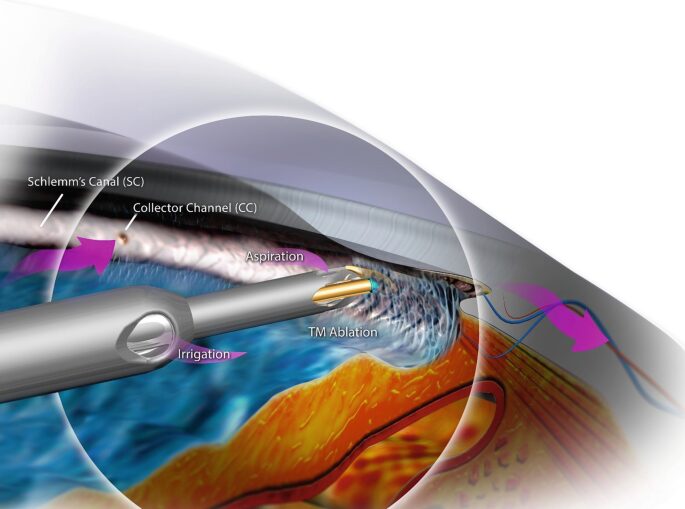Deep Sclerectomy Surgery in UK
Deep Sclerectomy is a specialized non-penetrating glaucoma surgery widely performed in the United Kingdom for patients who require long-term intraocular pressure (IOP) reduction. Unlike traditional filtering surgeries, it allows the eye’s fluid to drain naturally without creating a full-thickness opening in the sclera, offering a safer and more controlled method to manage glaucoma.
How Deep Sclerectomy Works
During Deep Sclerectomy Surgery, a surgeon carefully removes a thin section of the sclera (the white part of the eye) to create a drainage space. This space, known as the scleral lake, helps aqueous humor flow out gradually, reducing eye pressure while minimizing the risk of sudden pressure drops.
A thin membrane is left intact to maintain a natural barrier, which is why this surgery is referred to as non-penetrating. Sometimes, a collagen implant or a small spacer is inserted to keep the new drainage pathway open and stable.
When Deep Sclerectomy is Recommended
Deep Sclerectomy is recommended for patients with:
Primary open-angle glaucoma not adequately controlled by medication
Eyes unsuitable for laser procedures or previous failed surgeries
Those who prefer a safer alternative to trabeculectomy with fewer postoperative complications
This surgery is often chosen when maintaining visual potential and minimizing surgical risks are top priorities.
Advantages of Deep Sclerectomy Surgery
Deep Sclerectomy Surgery in the UK offers several benefits over traditional glaucoma procedures:
Lower risk of complications such as infection or hypotony
Gradual and controlled reduction of eye pressure
Faster recovery time compared to trabeculectomy
Less postoperative inflammation
Can be combined with antimetabolite therapy or implants for better long-term success
Many UK ophthalmologists recommend this surgery for patients who want effective glaucoma control with a safer healing process.
Procedure and Recovery
The procedure is typically performed under local anesthesia and takes around 45 to 60 minutes. After the surgery, patients are monitored for a few hours and may go home the same day.
Mild discomfort or redness can occur but usually resolves within days. Eye drops are prescribed to prevent inflammation and aid healing.
Most patients experience stable pressure control within a few weeks, though follow-up visits are essential to ensure proper drainage and long-term results.
Deep Sclerectomy Success Rate and Results
Studies across UK eye hospitals show that Deep Sclerectomy achieves significant intraocular pressure reduction in a high percentage of patients. Its success rate is comparable to trabeculectomy but with fewer postoperative complications.
For many, the procedure reduces the need for long-term medication, improving comfort and compliance.
👉 Learn about U.K. glaucoma care expenses in 2025.
This helps patients evaluate treatment affordability and compare various glaucoma surgery options available nationwide.
Possible Risks and Considerations
While generally safe, Deep Sclerectomy Surgery may include potential risks such as:
Temporary eye redness or mild discomfort
Minor fluid leakage or scarring of the drainage site
Rarely, need for additional procedures to maintain pressure control
These side effects are manageable with proper care and routine postoperative monitoring by your UK glaucoma specialist.
Deep Sclerectomy vs. Trabeculectomy
Although both surgeries aim to lower intraocular pressure, Deep Sclerectomy is less invasive. It maintains a natural membrane barrier, reducing the risk of sudden pressure drops and infections.
Trabeculectomy, on the other hand, creates a direct channel for fluid to exit the eye, which may carry higher risk but can offer greater pressure reduction for certain patients.
Your ophthalmologist will recommend the best procedure based on your specific eye condition and pressure goals.
Cost of Deep Sclerectomy in the UK
The cost of Deep Sclerectomy Surgery in the UK varies depending on the hospital, surgeon, and whether it’s done privately or through the NHS. Private clinics often include pre-operative assessments, surgeon’s fees, anesthesia, and aftercare in a single package.
Patients seeking private care should request itemized quotes for transparency and budgeting.
Conclusion
Deep Sclerectomy Surgery in the UK provides a safe, effective, and minimally invasive option for patients needing long-term glaucoma management. It offers excellent pressure control, fewer complications, and faster recovery than many traditional procedures.
For individuals with uncontrolled glaucoma or those looking for an alternative to trabeculectomy, Deep Sclerectomy represents a balanced approach—combining safety, stability, and lasting results.




